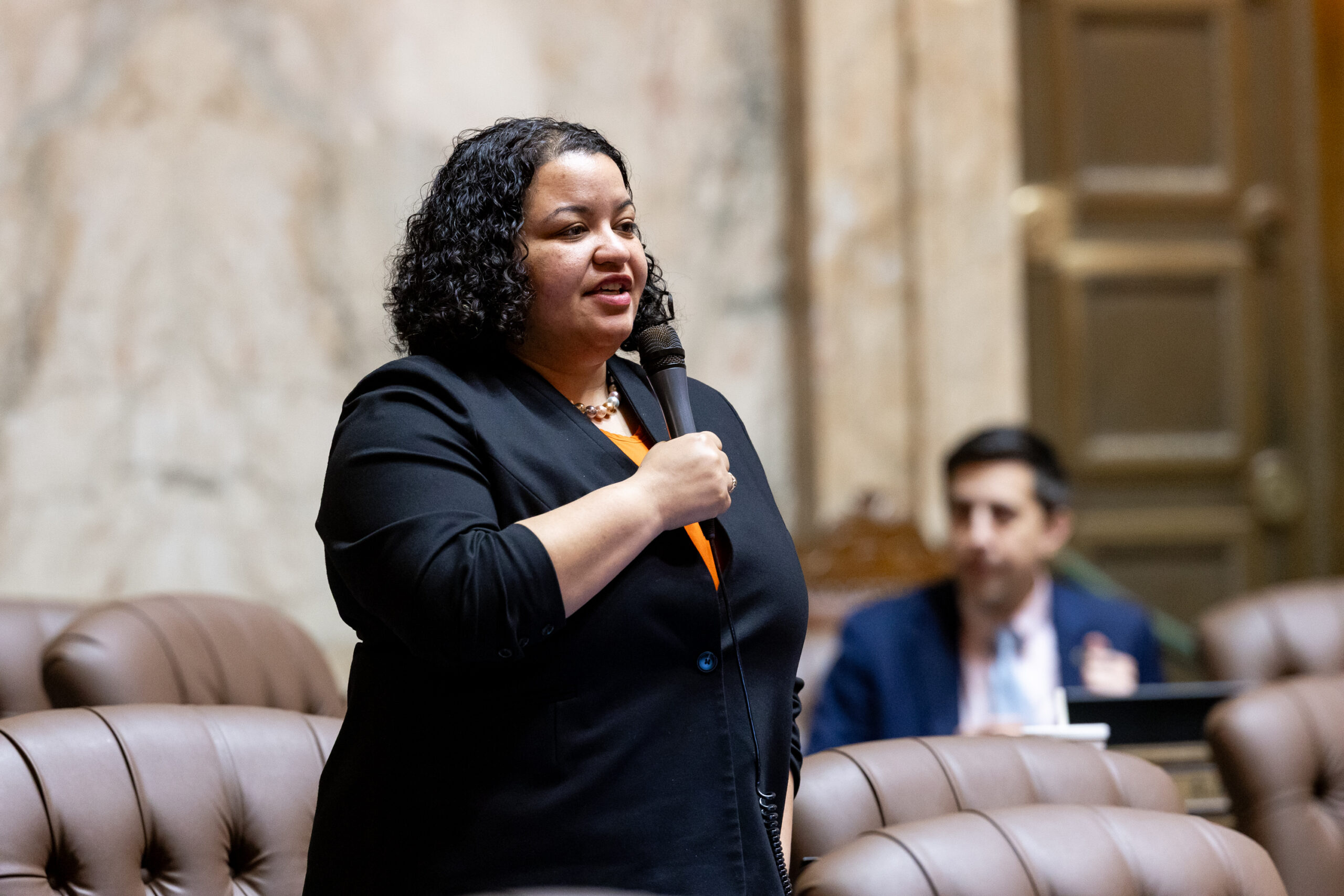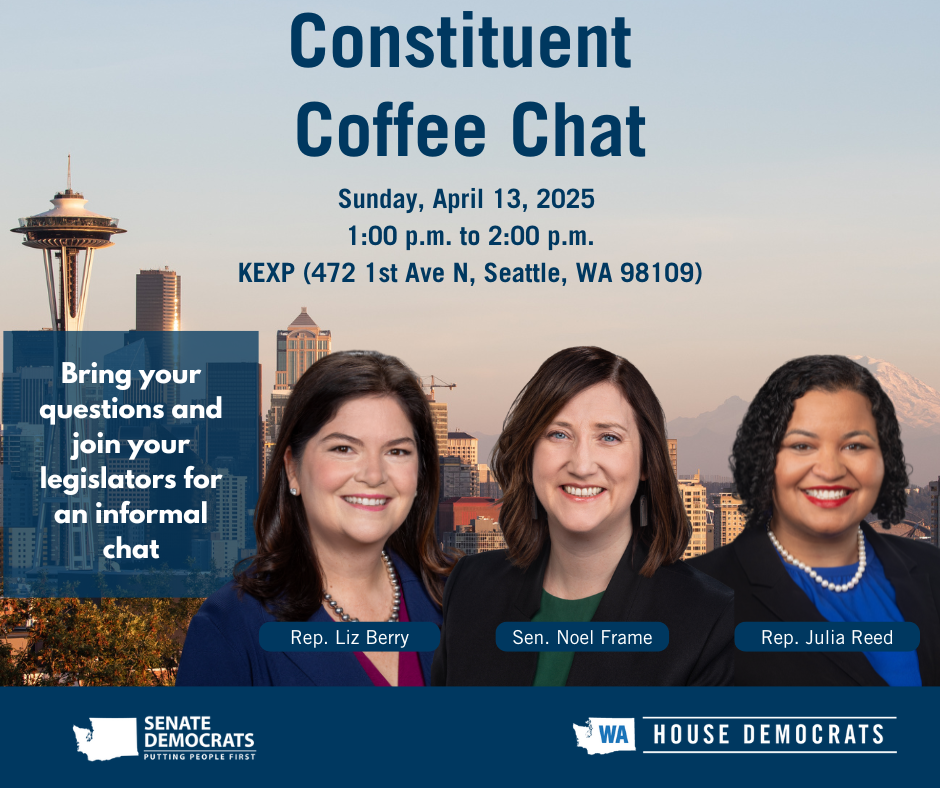
We’re entering the final stretch of session, which means budget negotiations are at the forefront of everyone’s mind.
Inflation and slow revenue growth have led to a significant budget shortfall, putting our regressive tax structure in the spotlight. In order to rectify this shortfall, my colleagues and I are considering a package of progressive revenue bills that will provide relief to Washington’s working people by ensuring that ultra-wealthy individuals and billion-dollar corporations are paying their fair tax share. Washington is an amazing place to live, and making the necessary adjustments to our tax code is the best way to balance our beautiful state’s budget for years to come.
I’m proud of the budget proposals my colleagues and I have put forward to respond to these challenging times. While the budget does not include everything I would have liked, it maintains funding for crucial services for our most vulnerable.
We recently lost Speaker Emeritus Frank Chopp. He was someone who tirelessly worked to improve the lives of all Washingtonians. Whether it was building more affordable housing, increasing access to healthcare, or helping more students enrollee in post-secondary education or training, everything Speaker Emeritus Chopp did was focused on building a Washington that left no one behind. I like to think he would be proud of the House budget’s focus on home, health, and hope – three values that he put at the center of state lawmaking.
_____

Budget highlights
Some of the highlights in this budget include:
- $1.1 billion for Special Education and Local Effort Assistance
- $45 million for school meals and summer EBT for kids
- $133 million for Food Security & Assistance
- $40 million for immigrant, refugee, and new arrival supports
- $6 million for youth homelessness diversion
- $6 million for the Tenant Right to Counsel Program
And on a personal note, I’m also excited about the $300,000 allotted in the budget to occupational therapy services for behavioral health clients. As the daughter of an occupational therapist, I know the important role they play in supporting those who deal with behavioral health issues. This is a smart use of public funds that will help address some of the biggest issues and support some of the most vulnerable populations in our state. Othe
Check out other budget highlights here.
_____

The need for progressive revenue
Washington no longer has the most regressive tax code in the country. We’re now 49 out of 50 – only Florida is ranked worse. Frankly, I think that’s embarrassing. It’s also a big reason why we find ourselves facing down such a huge deficit. If we’re going to continue to provide the services that make this a great place to live, we’re going to have to make some serious changes to our current revenue collection system.
We currently have three main proposals to make the necessary changes. They are:
- The FIT Tax: The Financial Intangible Assets Tax applies to assets like stocks, bonds, and mutual funds, with the first $50 million of assets exempt. Around 4,300 wealthy Washingtonians would be impacted, generating around $2 billion per year. This money would go to an Education Legacy Trust Account to support Washington families and fund investments in K-12 schools.
- The B&O Tax: A 1% Business & Occupation tax on businesses taxable income levels above $250 million. This would apply to around 400 of the wealthiest corporations in Washington. It also increases the surcharge on certain financial institutions from 1.2% to 1.9%, impacting roughly 200 institutions each with a net income of $1 billion or more. If it passes, this policy will bring in nearly $2 billion in state revenue that will shield essential public services from economic downturns and political uncertainty, creating a more stable and sustainable financial future for the state.
- The property tax change: This policy adjustment allows for property tax revenue growth to increase based on inflation and population changes, not to exceed 3 percent. A common misconception is that this will triple property taxes – in reality, if someone is paying $1 now, this policy would make the new price $1.03 (not $3). This could increase funding for state investment in K-12 schools by as much $150 million in fiscal year 2027.
And here’s a bonus revenue proposal – it’s not one of the main three, but I’m proud of the work it would do for our hardworking families:
- Removing the ACS Cap: My HB 1839 would remove the Advanced Computing Surcharge tax that tech companies who gross more than $25 billion annually pay into the Workforce Education Investment Account which helps support important scholarships like the Washington College Grant. The tax is currently capped at $9 million annually, and without a cap it would raise more than $600 million in the next four years. It’s a great option to raise revenue to help our students get to and through postsecondary education and make that education more affordable for all. These proposals shift the burden from working families and ensure that the wealthiest are paying their fair share. We’ve got a long way to go, but these revenue generators are a great start.
_____
Transportation Budget highlights
I proudly serve as a Vice Chair of the House Transporation Committee. In addition to bringing an urbanist voice to the committee, there is a lot of overlap with the work I do as chair of the Maritime Caucus. This year, I’m thrilled that our Transportation Budget focuses on improving mass transit (ferry system included!) along with bike and pedestrian safety in urban areas like our district.
- $1.9 billion for Washington State Ferries
- $686 million for statewide public transit improvements including free rides for youths on buses and light rail.
- $7.2 million for North Aurora Ave Safety Improvements
- $500,000 towards projects related to adding a lid to I-5
- $7 million from the Carbon Emissions Reduction account for e-bike rebates
- $28.8 million for pedestrian and biker infrastructure projects
_____
Join us for our next townhall!
We look forward to seeing everyone next Sunday at 1pm for the 36th LD constituent coffee chat!

_____
As always, it’s a pleasure serving you in Olympia, please don’t hesitate to reach out my door is always open!
In service,

Julia Reed
State Representative, 36th Legislative District
